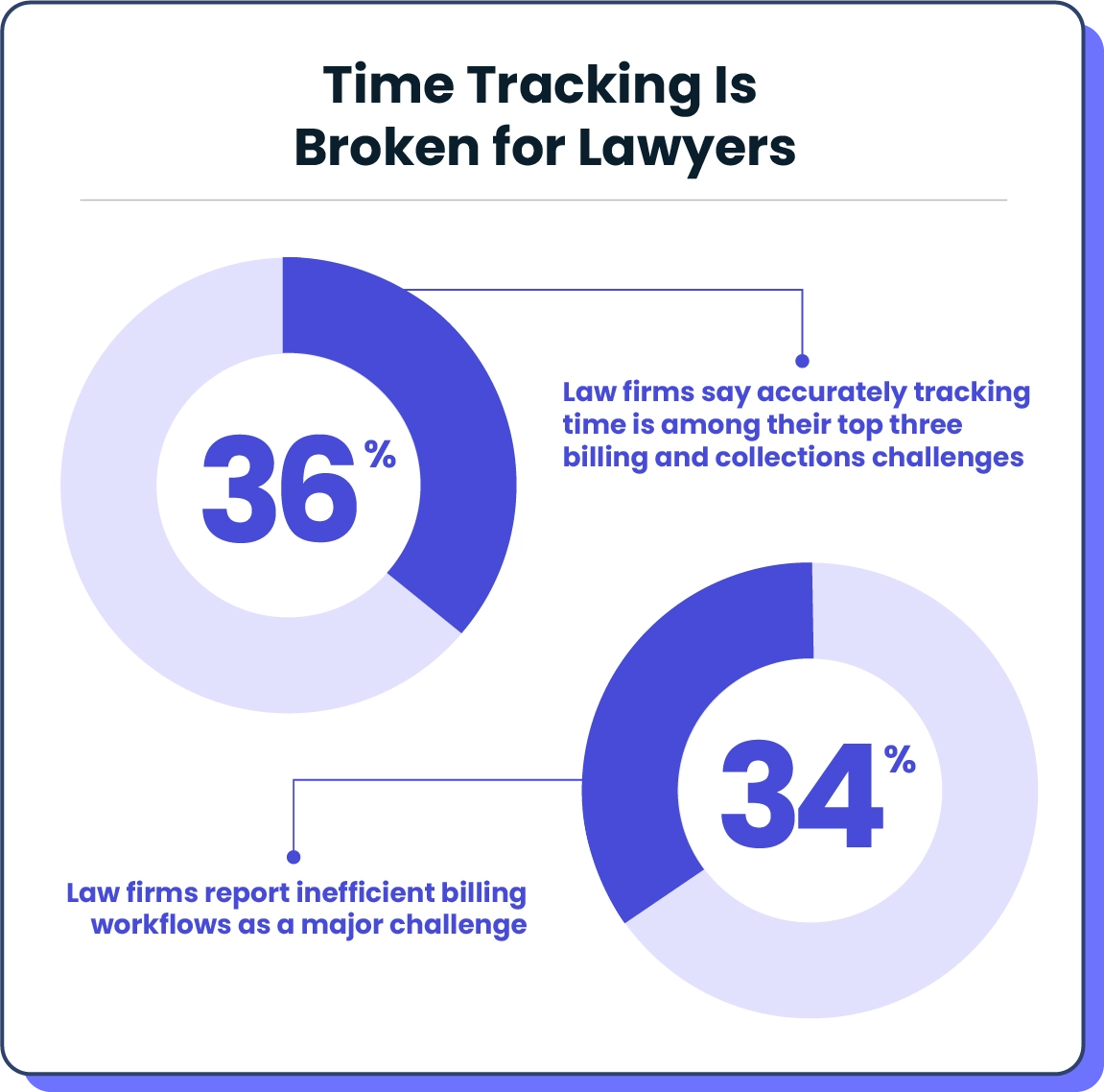Manual time-tracking is tedious and error-prone. Spreadsheet logs, handwritten notes, and end-of-day recaps take time to complete and often miss billable hours, creating a profit-killing combination of inefficiency and lost revenue.
Fortunately, artificial intelligence (AI) can solve the time tracking dilemma. Emerging AI technologies automate timekeeping for more efficient and accurate time logs. Even better, some AI time trackers for lawyers integrate directly with case management and legal billing software for a streamlined invoicing workflow.
This article supports your implementation of a faster, better time tracking system by exploring MyCase-compatible AI tools and their most powerful features.
Why Time Tracking Is Broken for Lawyers
If accurate time tracking and inefficient billing workflows are primary hurdles you face while running your law firm, you're not alone. According to the 2025 Legal Industry Report:
36% of law firms say accurately tracking time is among their top three billing and collections challenges.
34% of law firms report inefficient billing workflows as a major challenge. Manual time tracking and invoice delays are the main factors.

The prominence of time-tracking issues is unsurprising, given how lawyers have traditionally monitored their work. Attorneys often multitask amid a steady flow of interruptions, such as client phone calls or team member clarification requests. The hectic environment works against efforts to record time immediately or to dedicate discrete time blocks to specific tasks.
As a result, lawyers may wait until the end of the day or week to reconstruct their activities from memory, with hints from their calendar, emails, and telephone logs. Unfortunately, this backwards-looking process is error-prone. Small tasks are easily forgotten, and large tasks may be recorded with less detail. Vague or inaccurate invoices can result.
The hidden costs of a broken time-tracking system can undermine the firm's growth efforts:
Non-billable hours rise as lawyers manually recreate their daily activities on spreadsheets, paper, or manual timing apps.
Revenue growth is hindered by lost billing opportunities.
Inaccurate invoices can frustrate clients and limit repeat and referral business.
What Is AI Time-Tracking Software?
Timekeeping is one of several administrative functions AI can streamline for the legal profession. AI time trackers use machine learning to detect, record, and categorize tasks. The software monitors calls, emails, and document creation to save accurate time records passively, without manual input.
AI time tracking for lawyers dramatically reduces the administrative burden of timekeeping relative to manual methods like notes and spreadsheets. Paper notes, digital notes, and spreadsheets require manual input of dates, times, and work performed. Someone then must transfer the time records and descriptions to the billing system for invoicing.
How AI Time Tracking Differs from Automated Timekeeping Tools
Automated attorney time tracking software improves on manual processes, but it still requires human intervention. For instance, timers can calculate the time spent on a task if lawyers remember to toggle the timer on and off. Other automated tools may have more robust capabilities, such as automatic tracking of calls logged and resolved, messages sent, new notes saved, uploaded documents, shared events, and more. AI time tracking for lawyers operates without prompting or intervention, though it still requires human oversight. These applications detect activities and log them to the appropriate case file automatically.
Automated timekeeping and AI-powered timekeeping both have benefits over manual processes. They reduce administrative tasks, improve billing accuracy, and streamline billing. AI can provide amplified benefits because it takes automation one step further. A robust legal AI time-tracking application can recognize patterns, categorize tasks, suggest entries, and identify missed time. By contrast, non-AI automated tools can only follow pre-defined rules.
If your team currently tracks time manually, you can reduce the team's administrative burden by upgrading to automated or AI-powered attorney time tracking software. The right solution depends on your team's size and workflows.
Note that if you haven't yet deployed legal AI software in your law firm, consider defining standards for the ethical use of AI to socialize across your team.
Top AI-Powered Time Tracking Tools for Lawyers
Lawyers and legal teams can choose from several AI-powered time tracking tools that create ready-to-bill time entries without disrupting team members from their work. Top options to consider include:
Billables AI
Tempello
SmartTime by BigHand
Laurel
These applications can be easier to implement and offer more direct features for time tracking, compared to AI chatbot solutions like ChatGPT. Below, we’ll dive into the benefits of each.
Billables AI
Billables AI, designed for lawyers and other service providers, tracks time across Microsoft 365, Google Workspace, Teams, Chrome, Edge, and Zoom. The application logs time spent and describes each entry.
Law firms report recovering 10% to 30% more billable time using Billables AI.
You can easily connect Billables AI to MyCase. The integration allows you to export Billables AI time entries to the corresponding case and matter within MyCase.
Tempello
Tempello automatically tracks time spent on client emails and creates descriptive time entries in your default billing increment. Lawyers can maintain their workflow while capturing time records without being disrupted by application switching or turning timers on and off.
Tempello also integrates with MyCase to log entries to the appropriate client and matter. The application also saves the body of the email to the case file.
SmartTime by BigHand
SmartTime automatically records time and writes descriptions. Lawyers can quickly tag entries with the relevant clients and matters. Pre-populated entries for common communication activities, like sending emails, streamline the process further. The application's automated time capture can increase billable hours by eight to 10 hours monthly per timekeeper.
SmartTime also has a manager approval workflow. Managers can review and approve time entries or return them for revisions.
Laurel
Laurel tracks emails, meetings, documents, and internet usage. The application also highlights time gaps so you can capture offline billable work. Without help from the lawyer, Laurel groups similar activities into work sessions, suggests clients, matters, billing codes, and entry descriptions.
In addition to reducing the administrative burden for lawyers, Laurel also provides aggregate reporting so law firm managers can evaluate the true cost of services. The data can help optimize fixed fees and hourly rates for improved profitability.
Key Features to Look for in AI Time Tracking Tools
The following AI time tracking software features are most likely to boost the efficiency and accuracy of your billing process:
Automatic capture: Automatic capture monitors activities across specific apps to create time entries without manual input.
Case/matter tagging: Time entries are automatically categorized and logged to the appropriate case.
Mobile-friendly interface: Entries can be logged, reviewed, and updated from a mobile device.
Real-time reporting: Detailed and aggregate reporting allows lawyers and managers to review and evaluate time entries to identify trends and opportunities.
Integration with practice management systems: Practice management system integration is critical to avoid duplicate data entry.
Turn Lost Minutes Into Billable Revenue
Untracked time is a common revenue leak for law firms. Recapturing that time can boost revenue immediately by 10% or more. All it takes is a modern timekeeping system.
If your lawyers record time manually with hand-written notes or a spreadsheet, consider upgrading to an automated or AI-powered system. The switch will likely increase the number of recorded billable hours and improve revenue, cash flow, and your utilization rate. Two options to consider are:
Native time tracking in MyCase: MyCase automated time tracking logs calls and emails automatically. It also prompts lawyers to save entries for other work activities, such as uploading documents or saving notes. Additionally, Smart Time Finder creates a list of the day’s billable activities, which lawyers can use to create detailed time entries quickly. The ability to review, update, and add to time logs from within MyCase eliminates time spent toggling between applications.
Billables AI integration with MyCase: The Billables AI integration provides MyCase users with an AI-powered solution that logs time entries without lawyer input.
Experience the power of automation by enabling time tracking within MyCase. You can also explore the Billables AI integration if you're ready to deploy hands-off AI time tracking for lawyers. Book a MyCase demo today.
AI Lawyer Time Tracking FAQs
About the author

Catherine BrockContributing author
Catherine Brock is a financial and fashion writer who’s been featured on BBC News, USA Today, MSN Money, Fox2 St. Louis, ABC7 Chicago, CBS2 Los Angeles, WGN Chicago, and WCPO Cincinnati. She also contributes regularly to Forbes.com and Yahoo Personal Finance. When she’s not picking top stocks, sharing budgeting advice, or shopping for clothes, you can find her riding a horse in the countryside.
